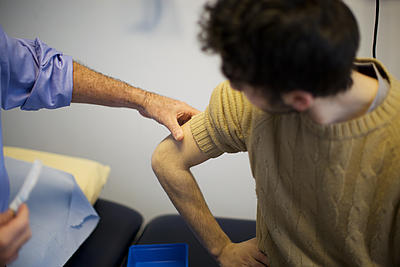Young people urged to get vaccinated against meningitis and septicaemia before starting university
Friday, August 19, 2016

Young people going to college or university this autumn are strongly encouraged to get vaccinated against meningitis and septicaemia (blood poisoning) due to the MenW bug, one of the most aggressive and deadly strains of Meningitis. Cases of MenW have been increasing year-on-year, from 22 cases in 2009 to nearly 200 cases in the past 12 months.
There are a number of strains of the infection and the vaccination gives protection against four of them– MenA, MenC, MenW and MenY. These illnesses can be deadly and survivors are often left with life-changing disabilities.
Young people going on to university or college are particularly at risk of meningitis and septicaemia because they mix with so many other students, some of whom are unknowingly carrying the bacteria. But anyone in this age group is strongly advised to get the vaccination – whether starting college or not.
GPs will be writing to the following groups to encourage them to get vaccinated at their surgery as soon as possible:
- all 17 and 18 year olds (school year 13; born between 1/9/1997 to 31/08/1998);
- 19-year-olds who missed getting vaccinated last year (anyone born between 1/9/1996 to 31/08/1997);
PHE is also advising anyone aged up to 25 who is starting university to get vaccinated by their GP.
Ideally young people should get vaccinated before term starts – to ensure immunity. But anyone can still get the jab from their new GP in their college town.
The MenACWY vaccination programme was introduced last year in response to a large increase in infections caused by a highly aggressive strain of group W meningococcal bacteria (Men W).
The disease can develop suddenly and progress rapidly. Early symptoms include headache, vomiting, muscle pain, fever, and cold hands and feet. Students should be alert to the signs and symptoms and should not wait for a rash to develop before seeking medical attention urgently. Students are also encouraged to look out for their mates, particularly if they go to their room unwell.
The vaccine not only protects those who are vaccinated, but also helps control the spread of the disease amongst the wider population. This is the second year the vaccine is being offered to this age group.
Dr Rosemary McCann, deputy director for health protection at PHE North West said:
“Since 2009, there has been a rapid increase in cases of Men W across England, with students particularly at risk. Protecting young people from this potentially deadly disease as they embark upon one of the most important periods of their lives is vitally important. The vaccination will save lives and prevent lifelong devastating disability.
“We are encouraging all eligible 17 and 18 year-olds who have just left school to get vaccinated - particularly those heading to college or university. Young people and those around them should be alert to the signs and symptoms of meningitis and septicaemia. Get vaccinated as soon as possible, remain vigilant and seek urgent medical help if you have concerns for yourself or friends.”





